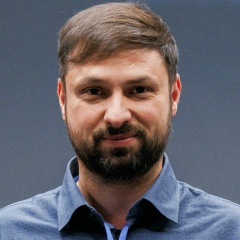Интересный текст про связь дофамина с серотонином и иллюзий с реальностью. Из курса физиологии цнс (*кроме всего курса самого по себе* - зачеркнуто) совсем не помню этих подробностей:
Дофамин – «гормон удовольствия», главный агент вознаграждения. Но выделяется он не после удовольствия, а в период его предвкушения, как доказал, например, Шульц. Это очень важно, поскольку помогает понять, что такое разочарование. Если считать, что разочарование – это недополучение чего-то чудесного, создается ощущение, что человек просто остается при своем. На самом же деле, он оказывается сброшен вниз, ощущает горе, потому что уровень его дофамина резко падает. Он чувствует себя так, как будто у него что-то отняли.
Дофамин является антагонистом серотонина, то есть подъем дофамина от предвкушения удовольствия связан с падением серотонина. То есть дофамин поднимается, а серотонин в это время падает ниже нормы. Серотонин – это тоже «гормон удовольствия», но если дофамин это «драйв», то серотонин – «удовлетворенность». Когда дофамин поднимается, серотонин падает, человек чувствует себя неспокойно, испытывает навязчивые желания, проявляет поисковую активность. С этим связана яркость иллюзий при очарованности любовью и стремление строить воздушные замки.
Когда дофамин падает от разочарования, серотонин не поднимается, то есть в обратную сторону антагонизм не действует. Низкий серотонин усиливает ощущение ямы, добавляя к переживаниям «падения» и бессилия, еще и тревогу, беспокойство, и поэтому страстное желание найти выход побыстрей, с помощью иллюзий.
Описанная схема означает, по сути, что чем сильнее разочарование реальностью, тем сильней стремление к очарованию иллюзиями, чем больше обида, тем острей желание близости, чтобы побыстрей поднять дофамин или серотонин. Но чем больше иллюзий, тем сильнее разочарует реальность, поскольку в иллюзиях ею почти невозможно заниматься.
Ну и далее, все та же крутая Эволюция:
http://evo-lutio.livejournal.com/69579.html
Дофамин – «гормон удовольствия», главный агент вознаграждения. Но выделяется он не после удовольствия, а в период его предвкушения, как доказал, например, Шульц. Это очень важно, поскольку помогает понять, что такое разочарование. Если считать, что разочарование – это недополучение чего-то чудесного, создается ощущение, что человек просто остается при своем. На самом же деле, он оказывается сброшен вниз, ощущает горе, потому что уровень его дофамина резко падает. Он чувствует себя так, как будто у него что-то отняли.
Дофамин является антагонистом серотонина, то есть подъем дофамина от предвкушения удовольствия связан с падением серотонина. То есть дофамин поднимается, а серотонин в это время падает ниже нормы. Серотонин – это тоже «гормон удовольствия», но если дофамин это «драйв», то серотонин – «удовлетворенность». Когда дофамин поднимается, серотонин падает, человек чувствует себя неспокойно, испытывает навязчивые желания, проявляет поисковую активность. С этим связана яркость иллюзий при очарованности любовью и стремление строить воздушные замки.
Когда дофамин падает от разочарования, серотонин не поднимается, то есть в обратную сторону антагонизм не действует. Низкий серотонин усиливает ощущение ямы, добавляя к переживаниям «падения» и бессилия, еще и тревогу, беспокойство, и поэтому страстное желание найти выход побыстрей, с помощью иллюзий.
Описанная схема означает, по сути, что чем сильнее разочарование реальностью, тем сильней стремление к очарованию иллюзиями, чем больше обида, тем острей желание близости, чтобы побыстрей поднять дофамин или серотонин. Но чем больше иллюзий, тем сильнее разочарует реальность, поскольку в иллюзиях ею почти невозможно заниматься.
Ну и далее, все та же крутая Эволюция:
http://evo-lutio.livejournal.com/69579.html
An interesting text about the connection of dopamine with serotonin and illusions with reality. From the course of physiology of the central nervous system (* apart from the whole course in itself * - crossed out) I do not remember these details at all:
Dopamine is the "pleasure hormone", the main agent of reward. But he stands out not after pleasure, but during his anticipation, as Schultz proved, for example. This is very important because it helps to understand what disappointment is. If we consider that disappointment is a lack of something miraculous, you get the feeling that a person simply remains with his own. In fact, he is thrown down, feels grief, because his dopamine level drops sharply. He feels as if he has been robbed of something.
Dopamine is an antagonist of serotonin, that is, the rise in dopamine from anticipation of pleasure is associated with a drop in serotonin. That is, dopamine rises, and serotonin at this time falls below normal. Serotonin is also a “hormone of pleasure”, but if dopamine is a “drive”, then serotonin is a “satisfaction”. When dopamine rises, serotonin falls, a person feels restless, experiences obsessive desires, and shows search activity. This is connected with the brightness of illusions when enchanted by love and the desire to build castles in the air.
When dopamine falls from disappointment, serotonin does not rise, that is, antagonism does not work in the opposite direction. Low serotonin enhances the sensation of the pit, adding to the experiences of “falling” and impotence, also anxiety, anxiety, and therefore an ardent desire to find a way out quickly, with the help of illusions.
The described scheme means, in fact, that the stronger the disappointment with reality, the stronger the desire for fascination with illusions, the more resentment, the more acute the desire for intimacy in order to quickly raise dopamine or serotonin. But the more illusions, the more the reality will disappoint, since in illusions it is almost impossible to deal with it.
Well and further, all the same cool Evolution:
http://evo-lutio.livejournal.com/69579.html
Dopamine is the "pleasure hormone", the main agent of reward. But he stands out not after pleasure, but during his anticipation, as Schultz proved, for example. This is very important because it helps to understand what disappointment is. If we consider that disappointment is a lack of something miraculous, you get the feeling that a person simply remains with his own. In fact, he is thrown down, feels grief, because his dopamine level drops sharply. He feels as if he has been robbed of something.
Dopamine is an antagonist of serotonin, that is, the rise in dopamine from anticipation of pleasure is associated with a drop in serotonin. That is, dopamine rises, and serotonin at this time falls below normal. Serotonin is also a “hormone of pleasure”, but if dopamine is a “drive”, then serotonin is a “satisfaction”. When dopamine rises, serotonin falls, a person feels restless, experiences obsessive desires, and shows search activity. This is connected with the brightness of illusions when enchanted by love and the desire to build castles in the air.
When dopamine falls from disappointment, serotonin does not rise, that is, antagonism does not work in the opposite direction. Low serotonin enhances the sensation of the pit, adding to the experiences of “falling” and impotence, also anxiety, anxiety, and therefore an ardent desire to find a way out quickly, with the help of illusions.
The described scheme means, in fact, that the stronger the disappointment with reality, the stronger the desire for fascination with illusions, the more resentment, the more acute the desire for intimacy in order to quickly raise dopamine or serotonin. But the more illusions, the more the reality will disappoint, since in illusions it is almost impossible to deal with it.
Well and further, all the same cool Evolution:
http://evo-lutio.livejournal.com/69579.html

У записи 13 лайков,
7 репостов.
7 репостов.
Эту запись оставил(а) на своей стене София Завьялова



























![Стас Однолетков -=[strast]=- Стас Однолетков -=[strast]=-](https://sun9-50.vkuserphoto.ru/s/v1/ig2/BQKIUfD3kthNCNNY9BS69xiPt_GjwVRhAU8D64L6gfeFjcmrTqYrLAC9NKgCppVxwhm79Mi5RypIHhjSHOhQK2uy.jpg?quality=95&crop=347,544,400,400&as=32x32,48x48,72x72,108x108,160x160,240x240,360x360&ava=1&cs=200x200)




